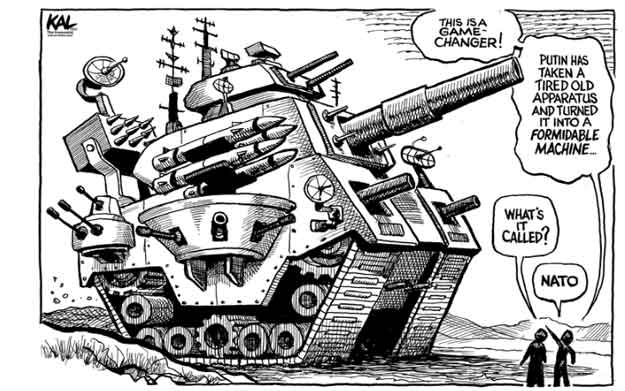
With the addition this year of Sweden and last spring of Finland to the North Atlantic Treaty Organization, the Baltic Sea has been dubbed a "NATO lake" by some analysts. A glance at a map shows that is largely (but not completely) true — the coastline has a couple of slivers of Russian territory. The rest of the coastal littoral is in NATO hands: Sweden, Finland, Estonia, Latvia, Lithuania, Poland, Germany and Denmark.
Russia controls a bit of coast between Lithuania and Poland because of its strange enclave of Kaliningrad. And President Vladimir Putin remains in control of the far eastern corner of the Baltic Sea in the approaches to St. Petersburg — ironically once thought of as the "window to the Western world" by the czars beginning with Peter the Great. Today, in the event of a conflict between Moscow and NATO, any of Russia's warships there would be quickly and easily bottled up or destroyed.
How should the alliance best take advantage of its new (nearly) lake, and what kind of exercises and training should the member-state navies be conducting to assure smooth teamwork?
When I was the alliance's military commander, I relished participating each fall in Baltic Operations, or BALTOPS. This premier NATO exercise has been conducted since 1972, with the next iteration in a few weeks.
I also took part in BALTOPS as a junior officer several times in the late 1970s, at the height of the Cold War. Then, the Baltic naval situation was fairly balanced between U.S.-NATO on one side and USSR-Warsaw Pact on the other. Sweden and Finland were strictly neutral. I remember standing bridge watches, needing to be very mindful of Soviet warships darting in and out of our formations, trailing us to gather intelligence (often at dangerously close distances), and generally harassing our ships.
Things have changed: Last year's Baltic Operations exercise included 20 nations, with Finland at sea for the first time as a full member and Sweden participating as an applicant. It boasted nearly 50 ships, 45 aircraft and 6,000 maritime personnel.
Significantly, the event featured a complex web of air-defense exercises, linking together the entire NATO land-based defense grid, alongside multiple guided-missile ships as sea. It it looked a lot like the coalition put together by the U.S. a couple of weeks ago that helped knock down 250 incoming drones, ballistic missiles and cruise missiles launched by Iran at Israel.
Central to the exercise was testing new technologies. The U.S. Sixth Fleet, which covers all European waters, focused on joint use of advanced minesweeping systems, unmanned underwater vehicles, airborne drones and unmanned surface ships — like the killer surface drones used so effectively by the Ukrainians against the Russian Black Sea fleet. BALTOPS successfully demonstrated how NATO could use its Baltic Sea forces across the spectrum of naval activity, and sent Russia an ominous signal of alliance capability.
A second element of Baltic naval control will be deploying sea-based air power — planes on our carriers — to hold down Russian air and sea capability. In what was probably a rehearsal for Baltic operations, a similar level of NATO maritime prowess has been on display in the Mediterranean for the last two weeks in Operation Neptune Strike: five carrier strike groups and dozens of ships from 11 nations.
Retired Admiral James Foggo, a former commander of all U.S. Naval Forces in Europe (and my key aide at NATO a decade ago), was a senior observer and mentor of the exercise. He told me that it was particularly important to see a French carrier strike group led by the powerful nuclear-powered carrier Charles de Gaulle under full NATO command for the first time.
Russia will push back against any NATO Baltic drills, although the correlation of forces at sea is now weighted heavily against them. Next month, they may move to short-of-war cyber and electronic warfare. This is akin to something they have been allegedly been attempting in the past few weeks, with commercial airliners as the targets. (Finnair has been forced to suspend normal daily flights to Estonia after several jamming events.) NATO can counter Russia's aggression by exercising both offensive and defensive electronic warfare at BALTOPS.
Finally, look for NATO to use its Baltic lake to put pressure on tiny Kaliningrad, which acts as a geographic wedge between NATO's Baltic states — Estonia, Latvia and Lithuania — and the rest of the alliance. Most of the Russian Baltic Sea fleet is based in the port of Baltiysk there, and Kaliningrad hosts significant air and missile forces. (There may also be tactical nuclear weapons.) In the event of war, Kaliningrad will need to be neutralized so Russian land forces — likely operating through Moscow's vassal state Belarus — cannot take control of the critical Suwalki Gap, which runs along the border between Lithuania and Poland.
To some this threat might seem overblown — what are the chances that Putin would create a major crisis at sea or invade one of the Baltic states? Well, three years ago the idea that he would launch an assault on Ukraine seemed unlikely too; don't try to outguess the man in the Kremlin. Those small nations are certainly taking it seriously: The former chief of Estonia's military intelligence unit warned that Russia would be ready to attack within four years. War games have predicted that Russian troops could take the capitals of Estonia or Latvia in less than three days.
Fortunately, the addition of Sweden and Finland to the alliance — call it "Putin's Folly" — gives NATO more options than ever in the Baltic Sea. While Russia has some capabilities, a continuous program of training, exercising and innovating will ensure NATO has total control over its new lake.
(COMMENT, BELOW)
Stavridis is a Bloomberg columnist. He is a retired U.S. Navy admiral and former supreme allied commander of NATO, and dean emeritus of the Fletcher School of Law and Diplomacy at Tufts University. He is also an operating executive consultant at the Carlyle Group and chairs the board of counselors at McLarty Associates.
Previously:
• 04/09/24 Latest ISIS attacks show the war on jihad is heating up
• 02/21/24 Ukraine's military reset is doomed without more US aid
• 12/21/23 US-led Naval force might not end Houthi ship attacks
• 11/22/23 Send America's floating hospitals to Gaza
• 11/08/23 What the US should do about Iran
• 08/30/23 Haiti needs a new UN mission, this time led by the US
• 08/16/23 To stop Iran's threat to Gulf ships, send the Marines
• 07/28/23 NATO convoys can protect Ukraine's grain harvest from Putin
• 07/28/23 Sweden and Finland give NATO an Arctic opportunity
• 07/11/23 US military's recruiting woes are a national-security crisis
• 06/02/23 Ukraine war may become a proving ground for AI
• 05/16/23 Iran's tanker seizures may bring U.S. convoys back to the Gulf
• 05/08/23 Sudan rescue mission is helping the US Navy prepare for war
• 05/01/23 Ukraine is running out of ammo. So is the US
• 03/10/23 The US military must create a Cyber Force
• 12/07/23 Putin will carpet-bomb Ukraine unless the West acts
• 10/14/22 Putin's campaign of terror from the air is already failing
• 09/08/22 Iran reveals how its naval warfare is changing
• 08/02/22 US needs a global alliance against Russia's cyberattacks
• 06/28/22What to expect from NATO's new strategic concept
• 04/13/22 Nukes? Ukraine war's most potent weapon may be a cell phone
• 01/18/22 Russia is pushing Finland and Sweden toward NATO
• 10/20/21 What Colin Powell taught me about war and optimism
• 09/14/21 Why the U.S. Navy is hunting pirates off Africa
• 07/29/21 Cuba and how Biden can avoid another Mariel boatlift
• 07/01/21 Donald Rumsfeld never gave in
• 02/16/21 Keeping troops in Afghanistan makes America safer
• 08/19/20 Military reasons to celebrate the Israel-UAE deal
• 07/02/20 Taliban bounties would be a new low even for Putin
• 01/02/20 May the 'Space Force' be with you
• 08/02/19 What Iran will do next, and how to stop it
• 05/06/19 The 'Five Eyes' intelligence-sharing alliance should expand, starting with Israel and Japan
• 04/24/19 Sri Lanka attacks mark the birth of terrorism 3.0
• 01/14/19 Iran's tiny navy is trying to revive the Persian Empire
• 06/04/18 US was right to give China's navy the boot
• 06/04/18 Big winner of Colombia's election is the US
• 05/17/18 Great power politics is back as U.S. aims at Russia with resurrected Navy fleet
• 03/20/18 Fake advice for Putin's fake win


 Contact The Editor
Contact The Editor
 Articles By This Author
Articles By This Author